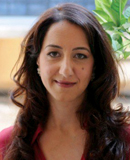Farnaz Fassihi: Reporting from the Middle East

March 25, 2015 — Farnaz Fassihi, senior Middle East correspondent for The Wall Street Journal and current Nieman Fellow, discussed how the nature of reporting on the Middle East has changed in recent years, and provided context and insight on current Middle East conflicts.
Fassihi began reporting on conflicts in the Middle East after 9/11, when she asked to be sent to Afghanistan to cover the war for the New Jersey Star-Ledger; a year later she was hired by The Wall Street Journal. Since 2001, she has covered the Second Intifada Palestinian uprising, the U.S.’s invasion of Iraq, the Iranian uprising and “Green Movement,” the Israeli-Lebanese conflict, and the Arab Spring.
During that period, Fassihi witnessed significant changes to Middle East coverage, with a heightened emphasis on security. “After 9/11, there was no question that I would just pick up a backpack with a small satellite phone and go off into Afghanistan and sort of improvise my way to Kabul.” Now she says, reporters are tracked with GPS devices and accompanied by security guards. “And sometimes, we don’t even go,” she added.
Instead, reporters rely on outside sources for coverage of the most dangerous regions, “and most of them have an agenda,” said Fassihi, which means verification is a crucial and time-consuming step. Relying on reports from local stringers also changes the nature of the coverage. Although Fassihi stressed that no story is worth a reporter’s life, she felt that “reporting is less original perhaps than it was a decade ago,” since reporters share the same sources, videos and Twitter feeds. In her coverage of the Iraq war, Fassihi tried to put a human face on the conflict, but said she has “a very hard time now trying to replicate that mission as a journalist” since she can’t be on the ground in Syria and Yemen.
Sometimes the lack of access means missing big stories. “We all missed the takeover of Mosul [Iraq]. Everybody was shocked…and I think it was because of our lack of access,” said Fassihi.
Gaining access to war zones by embedding with the U.S. military comes with its own problems. “In Iraq and Afghanistan…you have to follow certain guidelines…they make it very clear that if you violate any of these rules, you will be kicked off the embed,” said Fassihi. Among the guidelines were rules about photographing people killed in conflict, and the expectation of favorable coverage. “They didn’t like something I’d written about the process that went into the capturing of Saddam Hussein, and for three months, The Wall Street Journal could not get an embed…that access comes with a lot of strings.”
Regarding the future of the region, Fassihi is not optimistic, as she sees history repeating itself. “It’s extremists against pro-democracy, pro-Western, or it’s Shia against Sunni, pro-Iran against pro-Saudi…the same forces seem to be going in cycles.”
One of the roots of conflict, says Fassihi, is sectarian identity. “In many countries, like in Iraq, the Shias were marginalized and oppressed for many years. In Lebanon, the government really doesn’t take care of the Shia population,” which leads to increased support for Hezbollah. “It’s a terrorist group, but it’s also a political group – it has hospitals and orphanages and rebuilds the neighborhoods that Israel bombs in a way that the government does not.”
“This has led to each community feeling that they have to fend for themselves and rally around their sectarian identity,” she said. As a result, conflicts are no longer bounded by country – they become regional or even global, with people coming from all over the world to “defend the Sunni identity.”
Despite the bleak outlook, Fassihi said that some of her “most gratifying moments as a reporter have been encountering the resilience in people, and that human spirit in warzones…no matter how hard life gets…people still try to find a way to live a dignified life.” She described an interview with an Afghan teacher who, banned from teaching, established a secret school in her basement where she educated neighborhood girls for five years. “There is good news.”
Hear Fassihi discuss the Shia revival and its impact on politics in the Middle East, her thoughts on a U.S.-Iran nuclear deal, the spread of ISIS, Iran’s domestic policy, and the U.S.’s involvement in Syria in the full audio recording above.
Read an additional event summary from the Harvard Journal of Middle Eastern Politics and Policy.
Article by Nilagia McCoy of the Shorenstein Center.